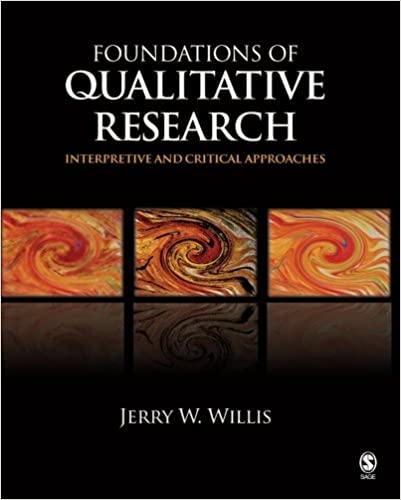Question
analyze following information: Present your research question as two or three versions, based on the different approaches you have explored that seem most appropriate to
analyze following information:
Present your research question as two or three versions, based on the different approaches you have explored that seem most appropriate to your research problem and purpose.
Research Question 1: " To what extent does the experience of childhood trauma influence the quality and dynamics of peer relationships among children, and are there specific types of trauma that have a more significant impact on peer relations?
Research Question 2: "How do the coping mechanisms developed by children who have experienced trauma in early childhood affect their ability to form and maintain positive peer relationships, and are there interventions that can mitigate the negative impact of childhood trauma on peer relations?"
Make a case for why each approach would work.
The first research question would be effective because it clearly defines the primary focus of the study. It examines the connection between childhood trauma and peer relationships among children. The specificity of this research question helps to craft and fine-tune the scope of the research. This research question allows for quantitative methods to be used. Also, this question allows me to explore the different types of trauma as independent variables
The second research question could also be effective because it shifts the focus from examining the impact of childhood trauma to exploring coping mechanisms used by affected children in response to trauma. By addressing coping mechanisms, the 2nd research question explores the psychological dimensions of how children respond to trauma. This question explores the variety of strategies that different children may employ to cope with the aftermath of their trauma.
Identify the approach you believe best fits your research question. Then, re-formulate the question based on the approach you selected.
The 2nd research question is well-suited for a mixed methods approach. A re-formulated question reads as follows: "How do the coping mechanisms developed by children, in response to early childhood trauma, influence the quality of their peer relationships? (Phenomological approach): What are the nuanced experiences and factors shaping these coping techniques? What measurable outcomes are associated with the coping techniques and how do they vary across a diverse sample of children?"
Describe how the approach you selected will direct the procedures you will later develop.
I would gather existing knowledge on the topic, reviewing all relevant literature, empirical studies and related frameworks. I would then assemble the sample of children, taking into account demographics such as their ages, gender, and the nature of trauma experienced. For the heuristic portion of the study, I would then conduct interviews. I would develop a survey to measure the variables in question.
Summarize your choice of theoretical framework for your prospectus. Justify how your choice aligns with your current choice of research question and approach. If they are not aligned, choose a more appropriate framework.
The theoretical framework that seems appropriate for this research question is Attachment Theory., developed by John Bowlby and Mary Ainsworth. This theory explores the emotional bonds formed between individuals in early childhood and posits that experiences shape an individual's attachment style and influence their social and emotional development. Coping mechanisms align with specific attachment patterns and indicate how children may relate to peers.
Given your choice of approach, describe what data collection tools will be most appropriate to consider.
Using a mixed-methods approach, as stated previously, i would conduct in-depth interviews consisting on open-ended questions, focus groups, and observations to obtain qualitative data; to conduct quantitative research, I would administer surveys and/or questionnaires and behavioral observations.
Step by Step Solution
There are 3 Steps involved in it
Step: 1

Get Instant Access to Expert-Tailored Solutions
See step-by-step solutions with expert insights and AI powered tools for academic success
Step: 2

Step: 3

Ace Your Homework with AI
Get the answers you need in no time with our AI-driven, step-by-step assistance
Get Started


